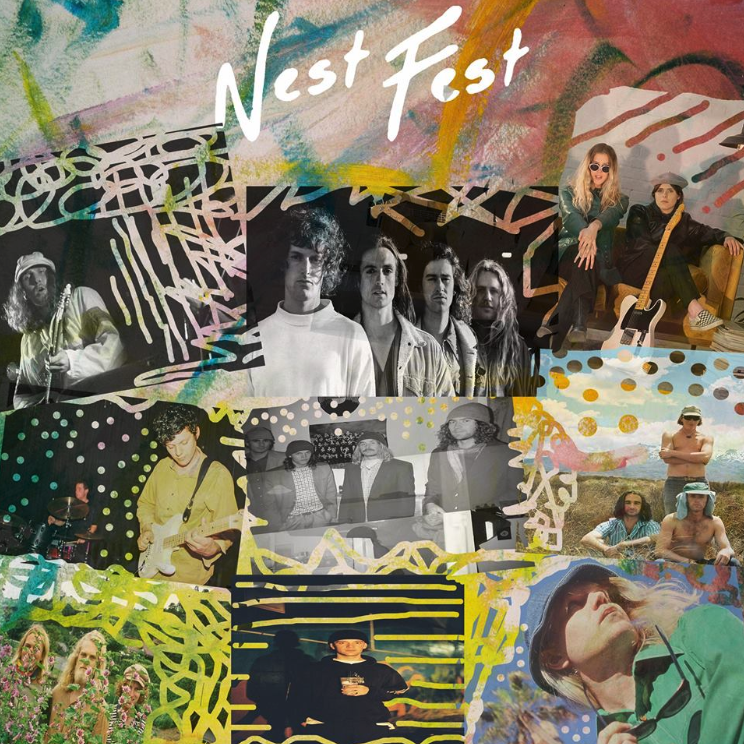
The conception of Nest Fest was built on promoting live bands who – they believe – are reshaping New Zealand’s music scene. While this could represent many across a range of genres, both Fabrin and Pettit have pinned it to the particular sound of live bands.
Pettit says, “The artists we have chosen relate heavily to the vibe of the festival we want to put on. And we have added a couple of larger international bands to encapsulate that.”
Some of these local artists, including The Soaked Oats, Marlin’s Dreaming, and The Shambles, have consistently sold out local venues of 500 people across the country, and Nest Fest provides an opportunity for these musicians to play at higher volume.
“We are constantly learning in all aspects of the entertainment industry, the idea of finding a paddock or a great location and bringing in the stage, the sound, and the power seemed a bit tormenting for our first festival. But I think with the venue we have got, we are able to tick off the boxes and really learn from putting on a larger scale event.”
Although Fabrin and Pettit are young, they have a growing portfolio of both music and event management, including sharing the responsibilities of BirdsNest, a local label set up by Petit in 2016 that focuses on music and event management, promotion and creative content with artists and clients.
“It is always a tough one to select who is on your line up and it always comes down to your budget in terms of the event you are working with. Being an independent festival, we don’t have the backing or success of previous years as this is our first year doing it. For us, it was always about trying to support a local market.”
Since the release of Nest Fest in early October, it has managed to sell out both its first and second release tickets, as well as half of its general admission third release ticket sales. Moreover, Pettit claims it’s a case of first in first served, rather than a concern about selling enough tickets.
Pettit says, “We have had very little spend on advertising thus far, so to get that many sales organically and with such a small budget behind it is amazing”.
Fittingly, the festival has managed to gain a foothold into a subculture of 18 to 28 year olds, and subsequently, brands have supported the cause. Some of these include Buddy T Shirts, Converse shoes, Three Wise Birds, Spark, and others.
“We have just partnered with Spark who are giving away five double passes, and they have just confirmed we have had the most engaging and reaching festivals out of all the festivals they have been involved with in New Zealand.”
Pettit says it’s important not to be permissive when letting brands attach themselves to the event, but to be sensitive about what the festival – and the bands – represent.
“You have to consider the artists names and brands they are building and if they want to be attached to the larger corporate sponsors that may want to be involved. For example, we didn’t want to take on any alcohol sponsors because we are all conscious of the culture that follows that.
“We have taken a step away from the booze sponsors and focused on the ones that can help with the sustainability of the festival.”
Further Nest Fest has partnered with companies such as For The Better Good – an alternative bottled water company who’s bottles can be repurposed and composted to help mitigate waste left unaccounted for at the festival.
“We would rather look for brands who see the purpose behind this and want to offer this to all of our festival goers – turning Nest Fest into a festival that cares about the health benefits for the days event and can supply the right necessities. Simply, but effectively.”
Pettit and Fabrin have also ruminated the possibility of repurposing festival props and art deco and turning them into something productive to put back out to the community once the festival has been completed.
“I believe the message of sustainability is an important one and if we can create an environment for people to enjoy themselves then we can create a longer lasting festival, one that looks after one another and our planet.”
When asked about the matter of diversity – or lack of – in the roster of bands, Pettit stands diplomatically. He says the second line up, set to be announced next week, plans for more diversity to strengthen the inclusive culture of the festival.
“It was quite hard for us find more female and diverse acts that fitted into the genre we wanted to push and were willing to play in January. It’s a massive topic and we are all very conscious of it, we want to continue the conversation and push for more diversity and female presence in years to come.”

Pettit identifies Laneway as the epitome of a local music festival that has proven success in parading diversity, cutting through the baggage, and focusing on the music. But he hopes Nest Fest can carve its own space in the condensed festival market.
“I’ve been to many events that both work and don’t work – i’m keen to take on this challenge and hopefully stamp a new festival in the New Zealand music scene. I want our artists to be stoked with their experience performing and the fans to have the space and freedom for them to be themselves and groove how they wanna groove at the festival.”
“If we put on a good enough show it might start to show a few holes in the music market here in New Zealand.”


